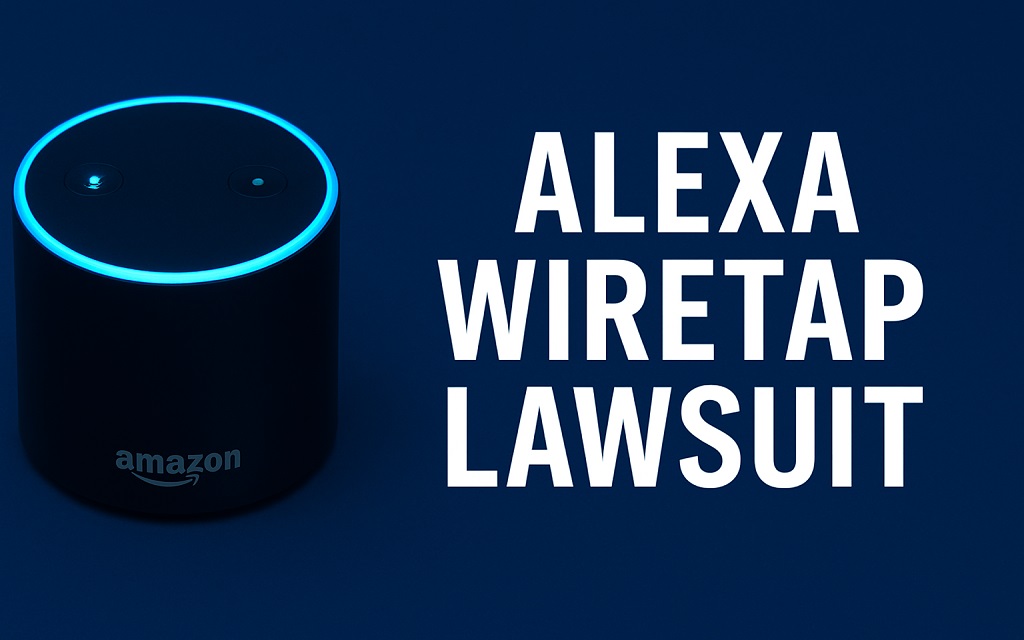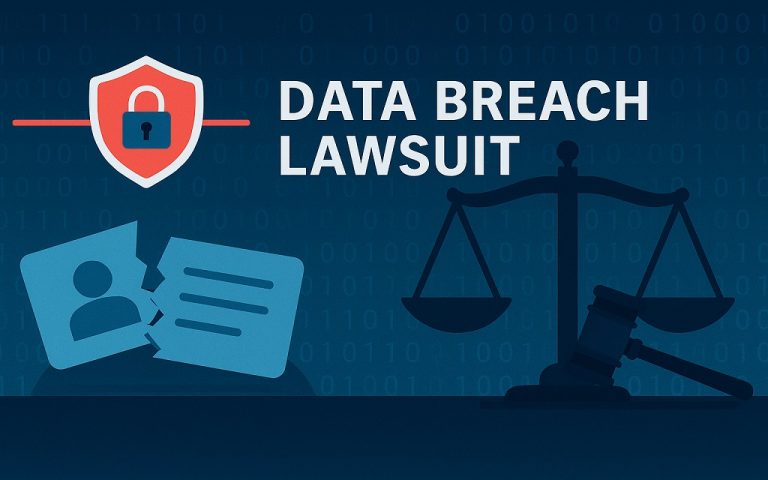The Alexa wiretap lawsuit is shaking up our understanding of voice assistants and their impact on privacy. Filed against Amazon, the Alexa wiretap lawsuit claims the company secretly recorded private conversations—even without users saying the wake word. Millions of Echo users now wonder: Is Alexa always listening?
Everything you need to know about the Alexa wiretap lawsuit is covered in this article, including consent concerns, legal claims, and the implications for your smart home. The Alexa wiretap case may directly impact your rights if you use Alexa or any other voice-activated device.
Why Did the Alexa Wiretap Lawsuit Start?
When American customers accused Amazon of surreptitiously recording talks using its Echo devices, the Alexa wiretap case got underway. Alexa went beyond the intended use of voice instructions, according to the plaintiffs. They argue that Alexa stored and transmitted private talks without consent. The case is in federal court in Washington. Judge Robert S. Lasnik oversees the matter.
Amazon denies the charges. The company says Alexa only records after hearing the wake word. According to Amazon, users gave consent through device disclosures and account settings. The company also insists that the disputed recordings did not capture sensitive material.
The plaintiffs disagree. They highlight moments when Alexa misheard random sounds and started recording. These false activations, also called false wakes, triggered the device even though users never said “Alexa.” The lawsuit claims these errors led to unlawful interception of private exchanges.
The stakes are high. Billions of dollars in damages are on the line. Plaintiffs also want Amazon to delete stored data and limit how Alexa handles future voice clips. The case raises broad concerns about smart home technology. It tests how privacy laws apply when devices blend into daily life.
At its core, the lawsuit asks a simple question. Can a voice assistant capture speech by mistake and still comply with state and federal wiretap laws? Courts must now decide how far consent extends when consumers use always-on devices in their homes.
Must Read: Class-Action Lawsuits: A Complete Guide to Legal Collective Action
Who Sued Amazon, & What Do the Plaintiffs Claim?
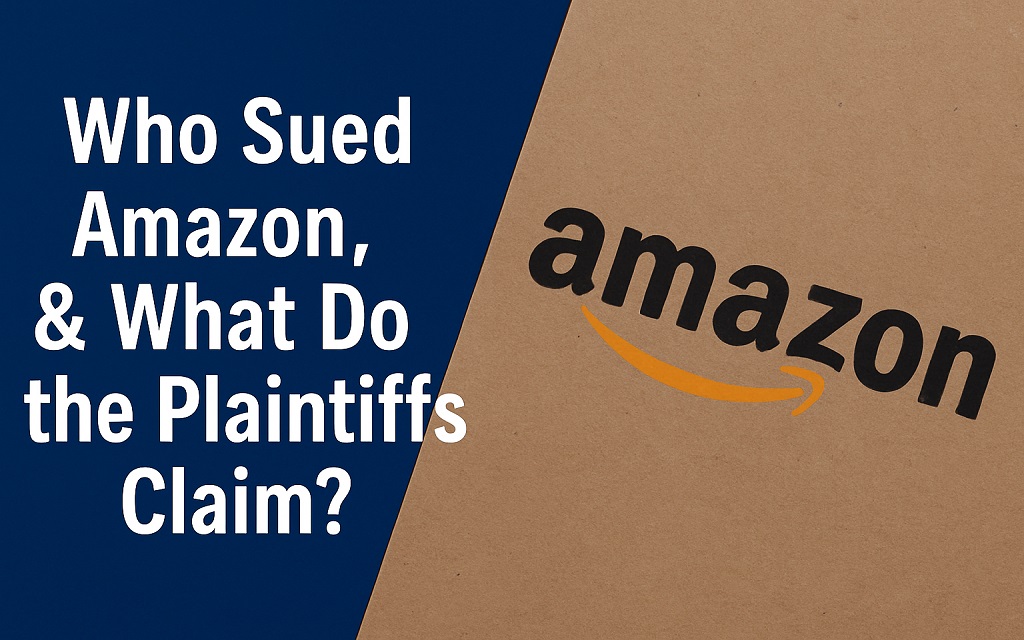
The lead plaintiff is Kaeli Garner. Several other consumers joined her in a proposed class action. They argue Amazon violated privacy laws each time Alexa activated without permission. Their complaint alleges hundreds of false recordings.
The plaintiffs say Alexa acted like an eavesdropper. They compare the device to a secret wiretap planted in private spaces. The class action framework expands the claims. It allows anyone with an Alexa device to join if they faced similar harm.
The legal theories rest on both federal and state statutes. Plaintiffs cite the Federal Wiretap Act. They also invoke Washington’s strong privacy rules. Other states with two-party consent laws could follow. The group wants nationwide relief.
Their claims focus on consent. Plaintiffs argue that Amazon never obtained valid consent. They say disclosures in device manuals or terms of service do not meet legal standards. They also say Amazon buried details about data storage. In their view, no reasonable consumer agreed to constant surveillance.
The complaint includes consumer protection arguments. Plaintiffs accuse Amazon of misleading marketing. They say the company presented Alexa as safe and limited in function. Yet in practice, the devices allegedly captured far more than commands.
The plaintiffs want the court to certify the class. If granted, the case could cover millions of Alexa owners. The financial exposure for Amazon could be huge. More importantly, the ruling could shape how voice assistant companies design consent systems.
Does Alexa Record Conversations Without Consent?
Amazon says no. The company maintains that Alexa only records after the wake word is spoken. According to its filings, Alexa holds a rolling buffer of a few seconds. This buffer never leaves the device unless activated.
The plaintiffs argue otherwise. They claim Alexa sometimes records without any wake word. They present examples where random sounds tricked the system. A cough, a laugh, or even the word “election” allegedly triggered the device. These false wakes produced recordings of unintended speech.
At issue is whether these mistakes equal unlawful wiretaps. Plaintiffs argue that private speech deserves protection even if captured by accident. Amazon counters that unintentional activation is rare. It says a human review of a tiny fraction of clips is necessary to improve the system. The company notes that these reviews are anonymous and disclosed.
Consent remains the central theme. Plaintiffs insist they never consented to recordings of offhand talks. Amazon states that consent was implied through the use of the devices and acceptance of the terms.
The question forces the court to weigh technology limits against strict privacy laws. Does a misheard sound void consent? Or do device owners accept that risk by bringing Alexa into their homes? The answer could reshape rules for all smart speakers.
How Do Wake-Word Errors Lead to Hot-Mic Capture?
Wake-word detection is how Alexa is activated. It searches for terms like “Computer,” “Alexa,” and “Echo.” A set of microphones runs a continuous analysis of ambient sound. This analysis happens locally on the device. Alexa records and transmits audio to Amazon’s servers after detecting the wake word.
When background noise mimics the wake phrase, false wakes happen. Machine learning models try to filter errors, but mistakes happen. The trigger can be imitated by a song’s lyrics, a TV ad, or an informal conversation. Even though no one intended for Alexa to be active, it starts recording when this occurs.
These moments are brief but significant. The device can capture fragments of conversation. Some recordings include names, addresses, or sensitive subjects. Plaintiffs argue this transforms Alexa into a wiretap.
Amazon responds that the error rate is low. The company emphasizes ongoing improvements in speech recognition. It also highlights features like auto-delete and user review options.
Still, the presence of false wakes raises legal risks. Lawmakers might call for stronger protections if a convenient system also records private speech. Whether these hot-mic moments transcend the boundary between a technological error and a privacy infraction is up to the courts to determine.
What Laws Could Apply to Alexa Recordings?
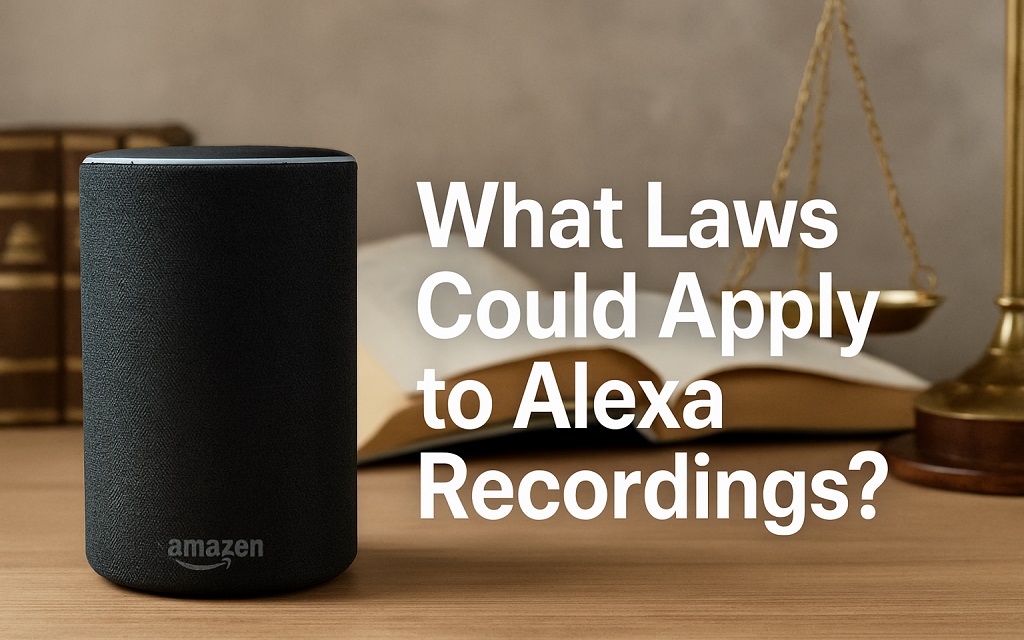
The Alexa wiretap lawsuit draws on several legal frameworks. At the federal level, spoken communications cannot be intercepted without the consent of all parties, according to the Wiretap Act. Plaintiffs claim Alexa recordings fall under this rule.
State laws also apply. Washington has its own Privacy Act. It requires consent before recording private conversations. Other states have two-party consent rules. These demand agreement from everyone involved in a conversation. Plaintiffs argue Alexa breaks these laws when it records guests who never consented.
Consumer protection statutes form another layer. Plaintiffs say Amazon misled buyers about Alexa’s functions. They argue that the company downplayed the scope of recording and data use.
Children’s privacy law enters the picture, too. The Children’s Online Privacy Protection Act, or COPPA, restricts the collection of data from minors. Plaintiffs suggest Alexa may have stored kids’ voices without proper safeguards.
Together, these laws create a complex legal map. Courts must interpret whether accidental voice capture equals interception. They must also decide if product disclosures meet the standard for consent. The case blends technology and privacy in a way few courts have seen before.
What Do Two-Party Consent States Require?
Two-party consent states require agreement from all parties in a conversation before recording. The federal criterion, which permits one-party consent, is not followed by these regulations. States with more stringent regulations include Florida, Pennsylvania, and California.
Two-party consent laws may be violated if an Alexa device records a visitor without their awareness. A houseguest does not sign the terms of service. They may not know Alexa is in the room. Plaintiffs argue this creates unlawful interception.
Amazon says disclosures cover these risks. The company points to visible lights on the device when Alexa activates. It also cites the ability to mute microphones. From Amazon’s view, guests in a home should expect the presence of a voice assistant.
Courts have long debated how consent applies in private settings. With Alexa, the debate expands. A home filled with connected devices may blur expectations of privacy. Judges must decide whether implied consent applies when guests have never agreed to constant listening.
This issue could set a national precedent. If courts rule Alexa violates two-party consent laws, it may force Amazon to redesign activation systems. Other voice assistant makers would likely face the same standard.
How Do Children’s Privacy Rules Affect Alexa?
Children’s privacy laws impose extra duties on companies. COPPA requires parental consent before collecting data from children under 13. This includes audio recordings.
The lawsuit raises concerns about how Alexa handles kids’ voices. Children may trigger false wakes during play. They may speak to Alexa without parental supervision. Plaintiffs say these scenarios lead to illegal data collection.
Amazon has policies for children. It offers parental controls and a “Kids Edition” device. The company says parents can manage data and delete recordings. Still, critics argue the default system captures too much before controls apply.
COPPA violations carry severe penalties. The Federal Trade Commission enforces the law and has penalized IT companies that participate in illegal data practices. If courts find that Alexa broke the law, Amazon might face fines and regulatory action.
The case demonstrates how child protection laws combine with new technology. Parents expect safe tools. Lawmakers want clear limits on how companies use children’s voices. Alexa’s role in family life makes this debate central to the wiretap case.
What is COPPA, And How Does it Fit Here?
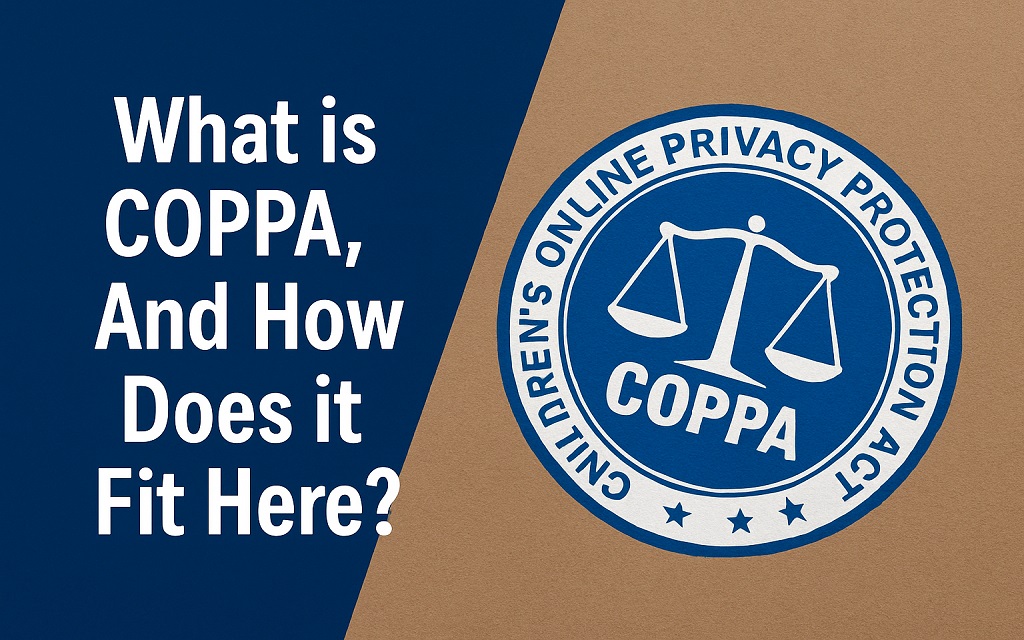
The Children’s Online Privacy Protection Act, or COPPA, is a federal law that was passed in 1998. It sets rules for online services that collect data from children younger than thirteen. The law requires explicit parental consent. It also mandates disclosures about data use and storage.
In the Alexa lawsuit, COPPA provides a framework for child-related claims. Plaintiffs argue Alexa captured kids’ voices without proper consent. They say parents were not given enough control. They also claim Amazon’s disclosures did not meet COPPA standards.
Amazon disputes these claims. According to the company, its devices are COPPA compliant. It draws attention to child-friendly settings, deletion alternatives, and parental dashboards. Amazon argues that parents have the tools to control data use.
Courts must decide whether Alexa’s design satisfies COPPA. The law was written before voice assistants became common. Judges must apply old rules to new technology.
The outcome could influence how other smart devices interact with children. If the court broadens COPPA’s reach, tech companies may need to rethink design choices. For now, COPPA remains a key piece of the Alexa wiretap lawsuit.
Do Biometric or Voiceprint Laws Cover Alexa?
Some states treat voice recordings as biometric data. For example, the Biometric Information Privacy Act (BIPA) is enforced in the state of Illinois. Before voiceprints are collected or stored, consent is required by law.
Voiceprints differ from raw audio. They are mathematical representations of vocal traits. Companies may use them to verify identity or tailor services. If Alexa creates or stores these prints, BIPA could apply.
Plaintiffs in similar lawsuits have cited BIPA. They argue Amazon collects voiceprints without permission. Amazon denies this. The company states that Alexa processes audio to understand commands but does not store voiceprints tied to individual identities.
Other states like Texas and Washington also have biometric laws. These may not mention voice specifically, but courts have interpreted them to include voice data.
The challenge lies in defining what Alexa actually stores. If the system only saves short clips without linking them to a person, biometric rules may not apply. However, more stringent regulations may apply if speech profiles facilitate speaker recognition or are related to user accounts.
The distinction between convenience and biometric surveillance becomes more hazy as more individuals use voice control to operate smart homes. The way Amazon uses speech data, how long it keeps it, and whether it helps with authentication or personalization will probably be examined by courts.
Amazon may be subject to severe statutory damages of up to $5,000 for each infraction if the court determines that BIPA is applicable. That threat gives biometric claims serious weight in this lawsuit and others like it.
What Facts Do Complaints Cite About Data Storage?
The complaint says Alexa stores user voice data for years. Plaintiffs claim Amazon keeps these recordings without clear limits. They argue the company uses this data for advertising, product improvement, and AI training—beyond the original purpose of responding to commands.
According to court documents, Alexa uploads voice clips to Amazon’s cloud. These recordings may then be transcribed, annotated, or reviewed by human staff. Amazon says this process is rare and anonymized. It claims only a “tiny fraction” of clips ever reach human ears.
The lawsuit also highlights device defaults. Plaintiffs argue Alexa begins storing data without user action. Deletion settings exist, but users must find and activate them. Critics say that makes consent unclear.
Amazon responds that users can manage their data. Settings include automatic deletion after 3 or 18 months. Users can delete specific recordings in the Alexa app. The company also offers mute buttons and indicators to show when Alexa is listening.
The dispute centers on what users knew and what they agreed to. If consumers did not expect long-term data storage, courts may find Amazon misled them. If disclosures were clear and options easy to use, the court may find consent was sufficient.
This tension between defaults and control sits at the heart of privacy law in the smart home era. How companies manage stored voice data could define future rules for the entire voice tech industry.
What Is Amazon Saying About Alexa’s Data Practices?
Alexa was developed with privacy in mind, according to Amazon. The business prioritizes openness and user control. In its privacy hub, Amazon states that Alexa listens only after hearing the wake word. It also says users can review, listen to, and delete voice recordings.
The company outlines multiple privacy features:
- A mute button disables the microphone.
- A visible light indicates when Alexa is active.
- Users can enable auto-delete options.
- Parents can use child-specific settings.
Amazon claims these features support informed use. It says device owners consent to data collection by agreeing to the Alexa Terms of Use. These terms disclose the possibility of data use for service improvement.
In legal filings, Amazon says Alexa does not “spy” on users. It argues that no interception occurs until activation. The company also says human review is rare and anonymized.
Critics say these protections fall short. They argue that settings are buried and disclosures are unclear. They also say users expect Alexa to follow commands—not to store casual conversations.
The court will examine how Amazon’s practices align with its public statements. If it finds a mismatch, plaintiffs may succeed on claims of deception or unfair practices. If Amazon’s disclosures meet legal standards, the company may avoid liability.
Ultimately, the issue comes down to expectations. Do consumers know how Alexa works? If not, who bears responsibility—users or the company that made the device?
What Did Past FTC Actions Say About Voice Data?
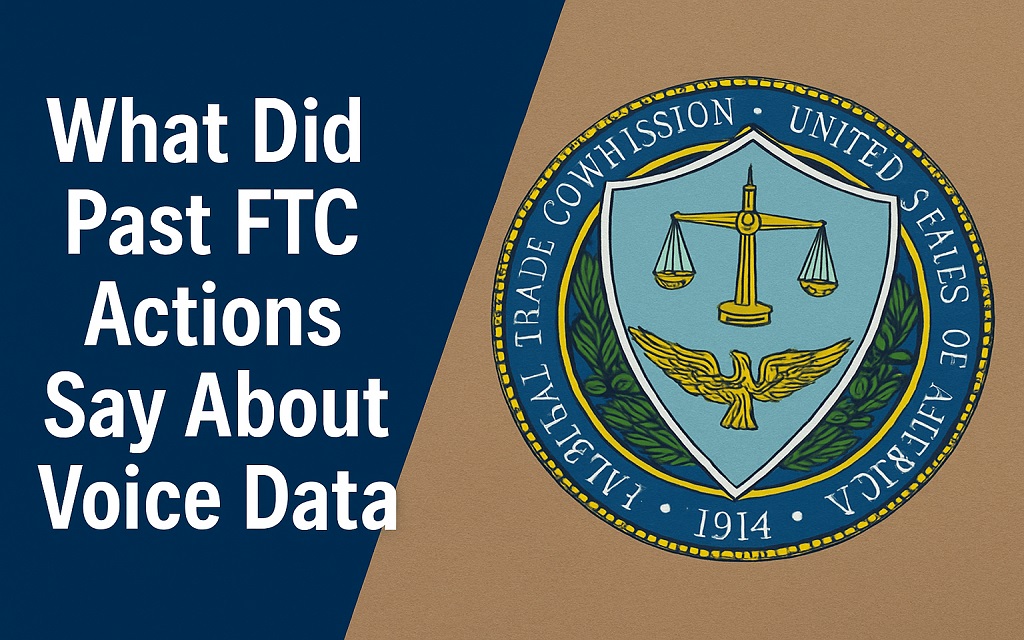
The Federal Trade Commission (FTC) has enforced voice data privacy in past cases. In 2019, the FTC fined Google and Apple for failing to protect children’s audio collected through voice apps. It also issued guidance warning companies about collecting audio without explicit consent.
The FTC says companies must:
- Tell users when recording occurs.
- Explain how recordings are used.
- Offer deletion or opt-out tools.
In 2020, the FTC investigated smart TV makers for capturing audio through “always-on” features. It warned that companies can’t hide such practices in fine print.
While the Alexa lawsuit is not an FTC action, the agency’s past enforcement shapes legal arguments. Plaintiffs use FTC principles to argue that Amazon misled users. They say disclosures were vague and did not meet best practices.
Amazon points to its privacy dashboard and clear links in device settings. It argues the company followed FTC guidance and went beyond what the law requires.
The FTC has not directly sanctioned Amazon for Alexa practices. However, its past actions reveal how regulators perceive audio capture. FTC guidelines are frequently cited by courts when determining whether something is fair or dishonest.
Even in the absence of an FTC penalty, the court may nonetheless declare Amazon’s actions illegal under state consumer protection statutes if plaintiffs can demonstrate that the company breached these standards.
What is the Role of Device Settings And User Consent?
Device settings play a key role in this lawsuit. Plaintiffs argue that Alexa’s default settings store voice data automatically. They say users must take extra steps to limit retention or disable review.
Amazon responds that settings are available and easy to change. Users can:
- Set auto-delete timers.
- Mute the microphone.
- Delete specific clips.
- Turn off human review.
But the lawsuit claims many users don’t know these tools exist. Plaintiffs say Amazon didn’t provide clear instructions or alerts. They also argue that using a smart speaker does not mean consenting to all data collection.
The key issue is timing and clarity. Did users know what Alexa would do with their voice? Did Amazon get consent before or after data collection began?
Courts will likely examine how Amazon presents these choices. If settings were buried or hard to find, the court may side with the plaintiffs. If users had simple, visible controls, Amazon could prevail.
This case may set a standard for what “informed consent” means in the age of always-on tech. Companies that rely on post-purchase disclosures may face new limits. Privacy laws could soon demand opt-in clarity from the start.
Must Read: Amazon Class Action Lawsuit: Eligibility, Refunds, Deadlines & More
Does Ambient Computing Comply with Existing Privacy Laws?
Devices that are integrated into everyday life are referred to as ambient computing. A network of bright lighting, thermostats, and speakers reacts to behavior and voice.
Alexa is a leading example. It integrates with smart home routines, regulates other devices, and listens for commands. But its always-ready state raises legal questions.
The lawsuit argues that ambient computing violates privacy by design. Plaintiffs argue that users cannot always determine when Alexa is listening. They also say the device responds to unintended prompts, making control difficult.
Amazon sees things differently. The company says ambient systems offer value through convenience. It argues that users expect this level of interaction. It also points to clear signals—like lights or chimes—that indicate activation.
Courts will weigh whether ambient computing creates unfair risk. If users can’t tell when devices record or how long data stays, judges may require stronger rules.
Some experts say ambient computing needs a new consent model. Instead of one-time terms, companies may need real-time alerts or regular reminders.
The Alexa case could shape how courts treat “invisible” technology. If ambient computing clashes with consent standards, companies may need to rethink how these systems work. That tension between ease and ethics stands at the heart of this legal fight.
What Damages or Remedies Do Plaintiffs Seek?
Plaintiffs in the Alexa wiretap lawsuit seek multiple forms of relief. First, they want monetary damages. This includes statutory damages under privacy laws and consumer protection statutes. In some cases, those damages could reach thousands per violation. With millions of users, the total could rise into the billions.
Second, they demand injunctive relief. This means the court could order Amazon to:
- Stop certain data practices.
- Change how Alexa stores voice data.
- Improve user disclosures and consent systems.
- Limit or halt human review.
Third, the plaintiffs ask the court to delete previously collected voice recordings. This step would require Amazon to erase data that came from unauthorized activations.
Finally, they want class certification. If granted, the case would cover all Alexa users affected by similar alleged conduct. This would expand liability and increase the chances of a large-scale resolution.
Amazon opposes these remedies. It says plaintiffs suffered no harm. The company argues that any audio collected was minimal, not private, and covered by consent.
The outcome may hinge on how courts interpret injury. If data retention or accidental recording counts as harm, the lawsuit could reshape privacy remedies across the tech sector.
How Do Courts Analyze “Wiretap” VS “Stored Data”?
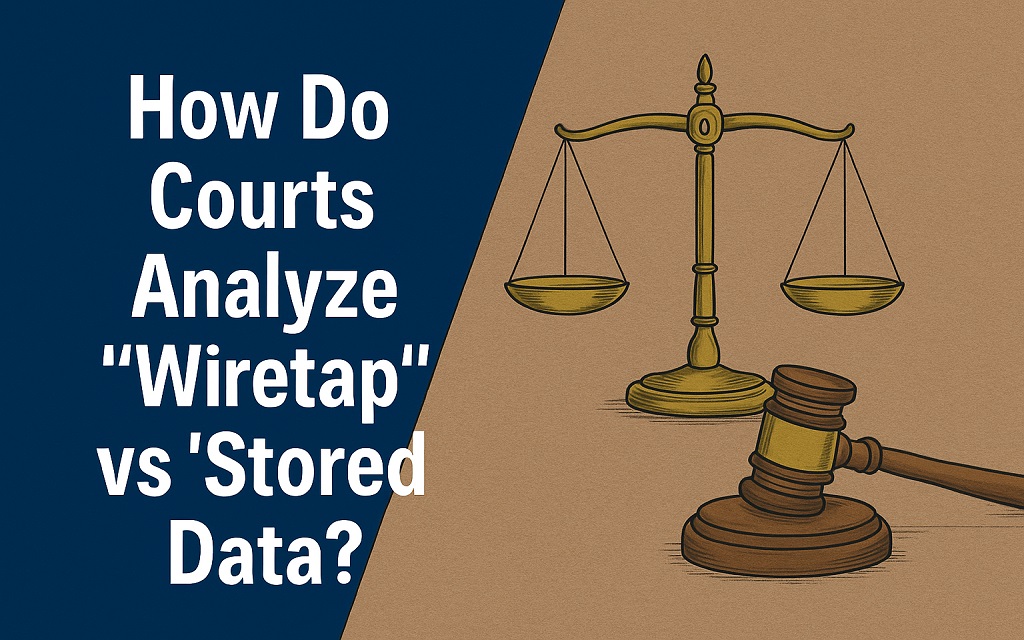
The law draws a clear line between intercepted communication and stored data. Wiretap laws like the Federal Wiretap Act apply to real-time interception. Other regulations, such as the Stored Communications Act, cover access to saved content.
In the Alexa case, plaintiffs say Amazon intercepted conversations through false wake recordings. They argue this happened before users consented, making it a wiretap violation.
Amazon counters that Alexa only records after activation. It says no interception occurs unless the wake word is detected. If audio is stored, the company claims different laws govern it.
The timing of the recording matters. Courts look at whether the data was captured in transit or saved after transmission. If Alexa begins recording before the intent is clear, that could support the wiretap claim.
Stored data laws often offer weaker protection. They may allow broader company access, especially if the user has already agreed to the terms.
This legal distinction shapes the whole lawsuit. If the court agrees that Alexa intercepted communication, the penalties increase. If it treats the data as stored content, Amazon could face a lower legal bar.
Do Arbitration Clauses Limit Class Actions Here?
Amazon’s Terms of Use include an arbitration clause. This clause requires most disputes to go through private arbitration, not a public court. It also consists of a class action waiver. That means users must bring claims individually.
In many cases, these clauses block lawsuits before they begin. But plaintiffs in the Alexa case argue this one should not apply. They say Amazon’s terms are unconscionable and have never received actual agreement from users. They also argue Alexa records people who never accepted any terms, such as guests or children.
Courts analyze arbitration clauses under state contract law. If a court finds the clause too one-sided or hidden in fine print, it may strike it down. That has happened before. In Berman v. Freedom Financial Network, the court rejected an arbitration clause buried in a link that was difficult to read.
Amazon will argue that users accepted the terms when activating Alexa. It will say that every buyer had the opportunity to read and reject the terms. The company will also argue that federal law—the Federal Arbitration Act—supports the enforcement of this agreement.
If the court enforces the arbitration clause, the case could shrink dramatically. Most class claims would disappear. If the court rejects it, the class could move forward. That decision may set the tone for other Alexa lawsuits and smart device litigation.
What Do EULAs And Terms Reveal About Consent?
Amazon’s End User License Agreements (EULAs) and Terms of Use describe how Alexa works. They explain that voice input is collected and stored. They also say Amazon may use this data to improve its services, including machine learning.
The key legal question is whether these terms provide real notice and valid consent. Plaintiffs argue they don’t. They say the terms are long, unclear, and buried in activation screens. Most users, they claim, never read them. Some users—such as visitors—never had a chance to see them at all.
Amazon disagrees. The company argues that the terms are linked in setup steps and easily accessible. It says users gave informed consent by using the device, reviewing settings, and accepting prompts.
Courts have to evaluate this based on the “reasonable user” standard. Would an average person understand the terms? Would they know Alexa stores voice data and may analyze it?
Courts also look at how active the consent is. Clicking “Agree” usually works. However, passive acceptance—such as using the device without reading the information—may fall short.
The Alexa wiretap lawsuit could define how companies present disclosures for voice-based tech. If Amazon’s terms fail the consent test, other smart device makers may face lawsuits, too.
Which Cases Set the Key Precedents for Voice Tech?
The Alexa lawsuit isn’t the first case to challenge smart speaker privacy. Earlier cases offer insight into how courts handle these issues.
In In re Google Assistant Privacy Litigation, plaintiffs alleged that Google’s devices recorded speech without consent. The court allowed some claims to move forward but dismissed others tied to users who consented through the terms of use.
In Lopez v. Apple, a California court dismissed claims that Siri secretly recorded speech. The court stated that the plaintiffs failed to demonstrate that Apple had intentionally recorded private conversations or used them unfairly.
The Alexa case stands out because of its scope and class claims. It includes alleged violations of multiple laws and covers tens of millions of users. The lawsuit also focuses more sharply on false wake recordings, not just voice storage in general.
Another related case is Ring Privacy Litigation. That lawsuit accused Amazon’s Ring doorbells of capturing audio without permission from people near the device. Plaintiffs said visitors were recorded unknowingly.
Each case adds pressure on courts to define boundaries. What counts as consent? What’s private? What’s incidental? The Alexa wiretap lawsuit may push these definitions further than any case before it.
What Happened in Earlier Alexa Mis-Send Incidents?
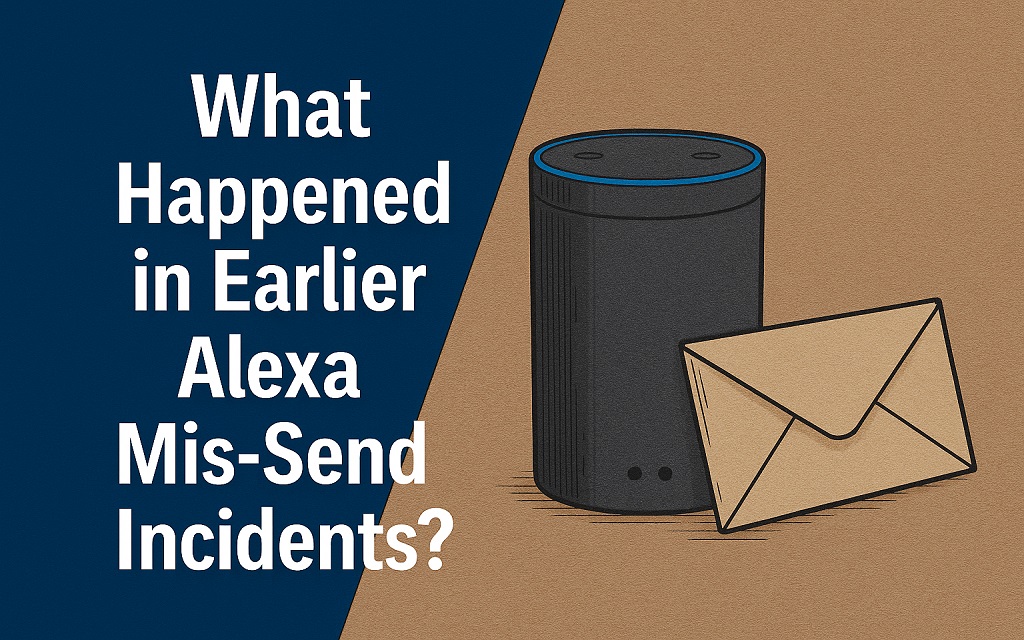
In 2018, an Alexa device accidentally sent a private conversation to a user’s contact, sparking anger over Amazon’s privacy practices. Portland, Oregon, was the scene of the incident. Alexa mistook background chatter for instructions to record and distribute audio to a third party, as a couple found out.
The company admitted the error but said it was rare. It claimed that a series of mistaken triggers—wake word, command to send, contact name confirmation—lined up to create the issue. Amazon claimed to have taken action to avoid a recurrence.
This issue raised public concerns even though there was no litigation. It raised questions about:
- Alexa’s command recognition reliability
- Whether multi-step confirmations are enough
- If private conversations are ever truly safe from leaks
That incident now appears in arguments within the wiretap lawsuit. Plaintiffs use it to show that Alexa can act unpredictably. They claim it proves the device doesn’t always behave in a limited, controlled way.
Even though the 2018 case was isolated, it helped shift public understanding of smart speaker risks. It showed that false activations and data misuse aren’t just theoretical. Real-world examples matter in court—and in the court of public opinion.
What Is the Connection Between Alexa Claims and Ring Litigation?
Amazon owns the Ring doorbell camera system, which has also been sued for audio and video surveillance. Plaintiffs allege Ring devices capture nearby conversations without consent. These suits claim violations of wiretap and privacy laws, especially in two-party consent states.
Ring devices are different from Alexa in function but similar in risk. Both operate in the background. Both may record people who didn’t consent. Additionally, both send data to Amazon servers.
One major Ring case—Burr v. Ring LLC—raised claims under California’s Invasion of Privacy Act. The plaintiffs said Ring recorded their voices as they walked near a neighbor’s doorbell. They had never agreed to that.
These cases highlight how privacy law now reaches beyond the home. If your voice is recorded outside your control, courts may view it as unlawful surveillance.
Amazon argues Ring recordings occur with obvious signs—such as camera lights and sounds. It also says property owners control when Ring records. Still, the lawsuits allege that visitors have no practical choice but to be recorded.
The Ring and Alexa cases show how Amazon’s growing presence in everyday life has legal consequences. Together, they challenge the concept of consent when smart devices record audio in both public and private spaces.
What Technical Steps Reduce False Activations?
Amazon uses several tools to reduce false wake word activations. These include:
- Acoustic modeling: Alexa devices train on speech samples to recognize only specific trigger phrases.
- Wake-word engine tuning: Engineers adjust sensitivity levels based on noise type and volume.
- Beamforming microphones: Multiple mics help locate and isolate speech to reduce ambient triggers.
- Confirmation sounds: Alexa often plays a chime when it activates.
- Visual indicators: A ring of light shows users when the device is listening.
Despite these tools, Alexa still makes mistakes. The system sometimes confuses similar-sounding words with the wake word. In noisy environments, this risk increases. Plaintiffs in the lawsuit argue that Amazon has not done enough to stop this.
Amazon counters that the false wake rate is low. It also points out that users can:
- Review all recordings in the Alexa app
- Opt out of voice review by Amazon staff
- Mute the device completely
Although these features provide safety, their effectiveness depends on user awareness and behavior. People may continue to be at risk if they are unaware of or unable to locate the available solutions.
Courts will assess whether Amazon’s security measures are compliant with the law. If not, new regulations might be implemented, such as shorter data retention times or real-time notifications.
How Do Retention Limits and Deletion Controls Operate?
Through the Privacy Settings in the Alexa app or browser dashboard, customers can control voice data. With these tools, users can:
- Delete recordings manually
- Enable auto-delete for data older than 3 or 18 months
- Turn off the option that allows voice data to be reviewed by Amazon staff
There’s also a voice command: “Alexa, delete what I just said.” Users can say this to erase recent recordings. Amazon says these tools meet privacy expectations. It claims to be transparent about storage and deletion. The company provides support documents and reminders to assist with setup.
But plaintiffs argue these controls are not enough. They claim the defaults favor Amazon, not users. Settings are opt-out, not opt-in. Some users may not know data is stored at all. Others may not understand the steps needed to delete it. The lawsuit also questions whether deleted data is entirely erased. Plaintiffs want to know if Amazon retains metadata or backup copies.
Courts have the right to request evidence that deletion tools function as promised. Amazon may be held liable under privacy rules if it is unable to confirm that recordings disappear when users remove them. Since deletion is the primary method by which users reclaim power, this issue is significant. If deletion isn’t reliable or easy, courts may question the validity of user consent altogether.
What Are Amazon’s Primary Defenses?
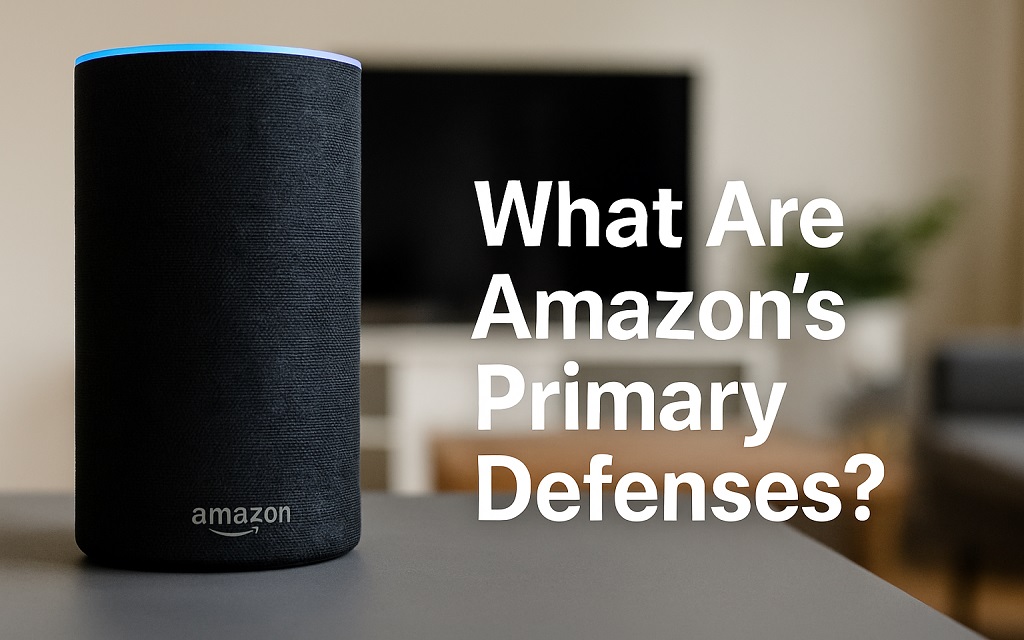
Amazon has laid out a multi-layered defense against the wiretap lawsuit. Key points include:
- No interception: Alexa only records after the wake word is spoken. There’s no secret capture.
- Consent: By accepting the Terms of Use, users consent to data collection.
- Implied consent: Alexa’s use indicates that people were aware of its operation.
- Minimal harm: Plaintiffs cannot show that the recordings included sensitive or damaging information.
- Disclosure: Amazon explains how Alexa handles data through its privacy policies and settings.
- Functional necessity: Voice data helps Alexa improve and perform as expected.
The company also argues that most users benefit from Alexa’s design. Features like smart home control, reminders, and voice shopping require voice data.
Amazon may also use contract law to limit claims. The court may dismiss the class action if users consented to arbitration.
The business will conclude by highlighting technical protections such as wake-word filters, visual cues, mute settings, and deletion tools. These could support Amazon’s claim that it complied with the reasonable care criteria.
However, those defenses might not hold up if the court determines that the recordings went beyond what was intended or that there was no legitimate permission.
How Could the Court Handle Certification Issues?
Class certification is a key step in this case. Plaintiffs want to represent all Alexa users whose devices recorded them without proper consent. They argue that Amazon’s system acted the same way for everyone. That makes a class action appropriate.
But Amazon strongly opposes this. It says every Alexa user had a different experience. Some enabled settings allowed recordings. Others opted out. Some read the Terms of Use, while others didn’t. These individual differences, Amazon argues, mean the case can’t proceed as one large class.
Courts apply Rule 23 of the Federal Rules of Civil Procedure when deciding class certification. It requires:
- Common legal or factual questions
- Typical claims among plaintiffs
- Adequate representation
- Fair and efficient resolution for all parties
Amazon says the suit fails these tests. The company argues consent, usage, and harm vary too much across users. Some plaintiffs had multiple devices, others only one. Some had auto-delete enabled, others did not.
The judge will weigh whether these differences outweigh the common issues. If class certification is denied, the case may splinter into individual claims. That reduces pressure on Amazon.
If the class is certified, Amazon faces far more risk. The case could affect millions of users. It would also raise the profile of Alexa privacy nationwide.
What Outcomes Look Likely Based on Similar Cases?
Smart speaker privacy lawsuits often reach a middle ground. Courts sometimes allow narrow claims to move forward while dismissing broader ones. Settlements are common, especially when tech companies want to avoid a public trial.
In similar cases:
- Google and Apple both saw claims dismissed in part due to weak allegations or strong user agreements.
- Facebook and TikTok settled biometric privacy claims without admitting fault.
- Amazon settled a 2023 Ring privacy case with the FTC for $5.8 million over concerns regarding children’s voice and video recordings.
In the Alexa case, the outcome could depend on:
- Whether the court accepts that “false wakes” count as interceptions
- How clear Amazon’s consent procedures were
- If arbitration clauses are enforced
If the judge finds no legal violation, the case may be dismissed entirely. If some claims survive, Amazon might settle to limit damages and avoid discovery.
A trial is possible but less likely. After significant legal obstacles like class certification or summary judgment are resolved, the majority of businesses would rather negotiate.
In any event, the ruling will influence upcoming legal disputes over voice assistants, Internet of Things gadgets, and user privacy.
How Does This Impact Smart Home Users Currently?
The lawsuit doesn’t just affect Amazon—it affects every smart home user. Many people use Alexa to control lights, music, thermostats, or reminders. These devices offer convenience. But they also listen constantly for the wake word.
Users should reconsider their privacy settings even before a final decision. Questions to ask:
- Do you know if Alexa stores your voice recordings?
- Have you enabled auto-delete?
- Have you reviewed your voice history?
- Do guests know Alexa is present and may activate?
The case highlights a simple truth: voice assistants can accidentally record more than you think. Smart homes are not always private.
Amazon says it offers straightforward controls and safeguards. But the lawsuit suggests many users don’t use them—or don’t even know they exist.
This lawsuit pushes users to take an active role. Go into your Alexa app. Check your privacy dashboard. Turn off features you don’t need. Use mute buttons when privacy matters.
Make sure the COPPA settings are correct for families with kids. Use parental controls and read the disclaimers if your children use Alexa.
The message is unmistakable: smart houses necessitate smart behaviors, regardless of the plaintiffs’ outcome.
How Should Parents Approach Alexa & Kids?
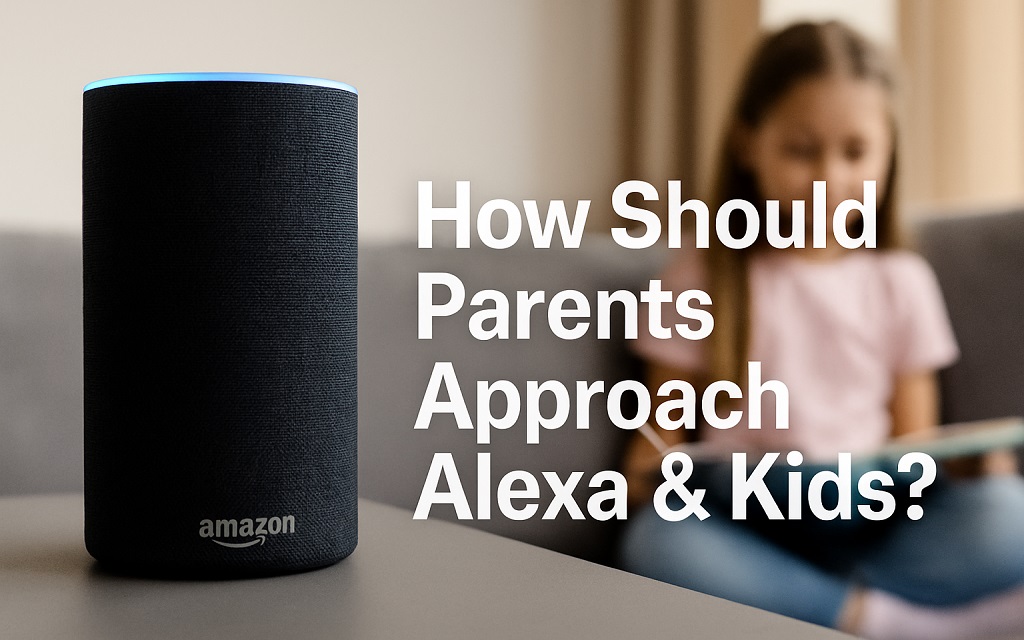
Parents often use Alexa for fun or educational tools. Many kids ask Alexa to play songs, tell jokes, or answer questions. But they may not realize that these interactions are recorded and stored.
Amazon offers a “Kids Edition” of Alexa. It includes:
- Parental controls
- Voice deletion options
- Filters for content and features
- Compliance with COPPA, the Children’s Online Privacy Protection Act
Still, plaintiffs argue that children often use regular Alexa devices. These don’t have strict controls by default. If parents don’t adjust settings, kids’ voices may be recorded without explicit consent.
To reduce risk, parents should:
- Set up child profiles
- Use the “FreeTime” or “Amazon Kids” features
- Review voice history regularly
- Turn off human review of audio
- Explain to children how Alexa works
The lawsuit brings new urgency to these steps. Parents should assume that every word spoken near Alexa could be saved, even if the device wasn’t addressed.
Schools and daycares that use Alexa face the same risks. COPPA requires strict consent and transparency. If institutions fail to meet that standard, they could face legal problems.
Voice assistants are powerful tools. But when children are involved, privacy rules change. Parents must stay aware, alert, and in control.
What Should Businesses Consider With Voice Apps?
Many businesses now integrate Alexa into their services. Hotels use it for room service. Healthcare companies test it for scheduling and medication reminders. Some banks even explore voice-based transactions.
This lawsuit offers a clear warning. Voice data = liability if not handled carefully.
Any company building Alexa Skills or using Echo devices should:
- Review data collection disclosures
- Confirm user consent is active and informed
- Minimize audio storage
- Avoid voiceprint or biometric data unless strictly necessary
- Keep up with changing state privacy laws
Businesses in two-party consent states face special risk. They must ensure all parties agree before capturing audio.
Companies also need to plan for device errors. False activations can lead to unintended recordings. If those recordings include customer information, the legal exposure grows.
The Alexa wiretap lawsuit could raise the standards for what constitutes a safe design. Businesses should not wait for a ruling. They should act now—auditing every Alexa use case, privacy policy, and settings profile.
What Does This Lawsuit Mean for Privacy Law Next?
The Alexa wiretap lawsuit is about more than one device. It represents a turning point in how courts view always-on technology. If the plaintiffs win, courts may set new limits on:
- Consent through Terms of Use
- Use of passive recording devices in private homes
- Acceptable defaults for data retention
- Collection of audio from minors or guests
Even if Amazon wins, the case highlights consumer confusion. Many people don’t realize what their smart devices store. Others don’t know how to opt out.
Lawmakers are watching. Several states have already passed biometric and voice data laws. The Alexa case may push Congress to consider a national privacy law with voice-specific rules.
Industry groups may also adopt best practices. These could include:
- Opt-in voice collection
- Shorter retention periods
- More visible recording alerts
The case also affects AI. Voice data trains machine learning. If that training uses unlawfully captured recordings, companies may face new challenges.
Ultimately, this lawsuit is part of a larger debate. Should convenience justify constant listening? Or must privacy come first, even in smart homes?
Summary and Takeaways
- The lawsuit claims Alexa recorded private conversations without consent. Plaintiffs argue Amazon violated state and federal wiretap laws.
- Amazon says all recordings happen after the wake word. It defends itself with privacy settings, disclosures, and Terms of Use.
- Consent, erroneous wake activations, recording children’s speech, and biometric information are critical legal concerns.
- Motions for class certification and summary judgment are still ongoing as of January 2025.
- Complete dismissal, a settlement, or a significant class-action litigation that changes privacy legislation are all possible outcomes.
- Users should take immediate action to analyze speech history, update Alexa settings, and think about how these devices function in multi-user scenarios.
- Businesses and parents face special duties. Consent rules are stricter for children and for audio in shared spaces.
- Laws about privacy are changing. Lawmakers, regulators, and courts could use this case to demand stricter regulations on voice technology.
This goes beyond just a lawsuit. It’s a test of how privacy survives in an always-listening world.
Where Can You Read Filings & Official Sources?
Here are some valuable links for readers who wish to see documents directly:
- Official Case Docket: Garner v. Amazon, No. 2:21-cv-00750 (W.D. Wash.)
(Search using PACER or RECAP browser tools) - Amazon Alexa Privacy Settings Page
- Reuters Coverage – Oct. 31, 2024
- FTC Guidelines on Voice Data
- Children’s Online Privacy Protection Rule (COPPA)
These sites provide personal knowledge of the court’s review process and Amazon’s defenses. Readers and researchers can use these links to follow updates or track future rulings.
Disclaimer: This article provides a general overview of the Alexa Wiretap lawsuit, based on publicly available information, and is intended for informational purposes only. It is not legal advice.
Musarat Bano is a content writer for JudicialOcean.com who covers lawsuits, legal news, and general legal topics. Her work focuses on research-based, informational content developed from publicly available sources and is intended to support public awareness. She does not provide legal advice or professional legal services.

